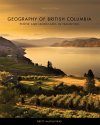Out of Print
By: Brett McGillivray(Author)
307 pages, b/w photos, b/w illustrations, b/w maps, tables
![Geography of British Columbia Geography of British Columbia]()
Click to have a closer look
About this book
Contents
Biography
Related titles
About this book
Why is British Columbia unique within Canada? What forces have made its landscape so rugged, its climate so varied, its population so diverse? Why did settlers come to the region, and what effect has their presence had on First Nations? What prompted so many Asian immigrants to come but then leave for other parts of the country? How have the rich resources of the land been exploited and managed?
In this fully updated edition of a now classic text – Geography of British Columbia – Brett McGillivray adopts primarily a thematic rather than a regional approach to answer these questions. Beginning with a regional overview and introduction to geographic concepts, he moves to discuss the physical processes that produced a spectacular variety of mountains, lakes, fjords, forests, and minerals. His thematic exploration traces the province's historical geography, including First Nations ways of life, colonization, Asian immigration, and the bitter history of institutionalized racism. Detailed accounts of the province's economic geography – forestry, fisheries, metal mining, energy supply and demand, agriculture, water, and tourism – culminate in a discussion of contemporary issues such as urbanization, economic development, and resource management.
This comprehensive introduction to BC's physical and human geography is enhanced by new and updated figures, graphs, and maps and by new discussions, including how globalization, climate change, and recession are influencing the province and its people.
Contents
Preface
1 British Columbia: A Region of Regions
2 Physical Processes and Human Implications
3 Geophysical Hazards: Living with Risks
4 Modifying the Landscape: The Arrival of Europeans
5 First Nations and Their Territories: Reclaiming the Land
6 The Geography of Racism: The Spatial Diffusion of Asians
7 Resource Management in a Changing Global Economy
8 Forestry: A Dominant Export Industry in Difficult Times
9 The Fishing Industry: Managing a Mobile Resource
10 Metal Mining: The Opening and Closing of Mines
11 Energy: Supply and Demand
12 Agriculture: The Land and What Is Produced
13 Water: An Essential Resource
14 Tourism: A New and Dynamic Industry
15 Single-Resource Communities: Fragile Settlements
16 Urbanization: A Summary of People and Landscapes in Transition
Glossary
Index
Customer Reviews
Biography
Brett McGillivray is professor emeritus in the Faculty of Geography at Capilano University, having taught the geography of British Columbia there for over thirty-six years. He continues to research issues on British Columbia and Canada, present lectures, and facilitate community-to-community meetings.
Out of Print
By: Brett McGillivray(Author)
307 pages, b/w photos, b/w illustrations, b/w maps, tables
Reviews of previous edition:
"McGillivray has done a tremendous job [...] This book is very well done, will make a valuable teaching resource, and deserves wide adoption."
– Greg Halseth, The Canadian Geographer
"A comprehensive, proficient, and intriguing geographic text [...] McGillivray's book is excellent, and no one who teaches the geography of British Columbia should fail to give it serious consideration for adoption. The book fulfils its aim well; it suceeds in providing fascinating insights in to the human-environment relationships in British Columbia."
– Joseph Mensah, The Canadian Geographer
"After reading this book, the reader will be well informed as to the major historical forces that have shaped British Columbia and the economic challenges confronting its future. It deserves to be read beyond the college geography textbook market."
– Michael J. Broadway, American Review of Canadian Studies, Winter 2006



































